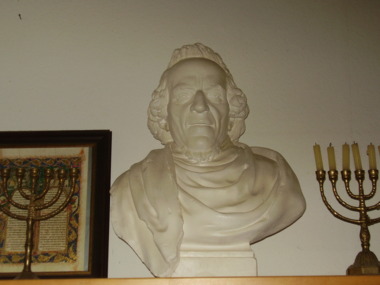02.05.2013, 06:32
Equality From the Ground Up: Streets in Berlin Must Be Named After Men and Women Equally
By Nina Porzucki ⋅ May 1, 2013 ⋅
All things being equal, well, sort of, that’s the theme of the Geo Quiz on Wednesday.
In the Kruezberg district of Berlin, women’s rights advocates are taking back the streets, or at least they are trying to.
An edict passed in 2005 says that no more streets can be named after men until there are an equal number of streets named for women.
However, there’s no immediate danger of that. The district has 375 streets and only 12 are named for women.
The city’s Jewish Museum happens to be in the district. The museum has been lobbying to name the square in front of its new academy after a famous 18th century German-Jewish philosopher.
But, you guessed it, he’s a man.
The city and the museum eventually agreed on a solution. After all, behind every great man, as the saying goes, is a great woman. So, in an effort to comply with the parity edict, they’re going to name the square after the philosopher and his wife.
For the Geo Quiz: Name that 18th century German-Jewish philosopher and his wife.
ANSWER:
The 18th century German-Jewish philosopher is Moses Mendelssohn and his wife Fromet Guggenheim.
Mendelssohn is a figure of the Enlightenment, a contemporary of the German philosopher Immanuel Kant. Born an orthodox Jew, Mendelssohn straddled Jewish and secular circles. Mendelssohn is widely regarded for his work promoting tolerance between Germans and Jews. He translated many Jewish texts into German.
His marriage to Fromet Guggenheim was a marriage of love — unusual for the time and situation. Guggenheim played piano, also unusual for the time.
1 comment:
Lorenzo Espadas • 8 hours ago
this is pathetic, a sign that the feminist movement has been long out of the hands of people seeking actual gender equity and taken over by "womyn" who seek to blame everything on some invisible patriarchy
Radiosendung auf BBC Radio 4:
In our time: Moses Mendelssohn
Melvyn Bragg and his guests discuss the work and influence of the eighteenth-century philosopher Moses Mendelssohn. A prominent figure at the court of Frederick the Great, Mendelssohn was one of the most significant thinkers of his age. He came from a humble, but culturally rich background and his obvious intelligence was recognised from a young age and nurtured by the local rabbi where he lived in the town of Dessau in Prussia. Moses's learning earned him the sobriquet of the 'German Socrates' and he is considered to be one of the principal architects of the Haskala, the Jewish Enlightenment, and widely regarded as having helped bring Judaism into the mainstream of European culture.
Mendelssohn is perhaps best remembered today for his efforts to bring Jewish and German culture closer together and for his plea for religious toleration.
With:
Christopher Clark
Professor of Modern European History at the University of Cambridge
Abigail Green
Tutor and Fellow in History at the University of Oxford
Adam Sutcliffe
Senior Lecturer in European History at King's College, London
Producer: Natalia Fernandez
www.bbc.co.uk/programmes/b01djnxx



